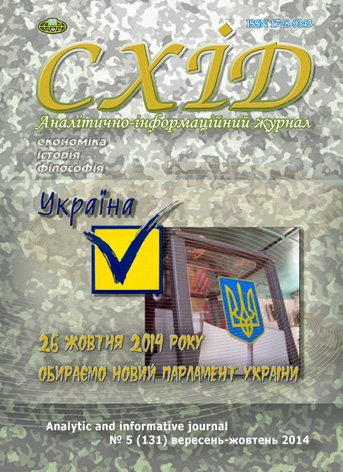St. Augustine's intentions in matters of individual and collective syncs in the area of policy
DOI:
https://doi.org/10.21847/1728-9343.2014.5(131).29661Keywords:
individual, collective, state, transcendent, immanent, illumination, social, associationAbstract
Disclosed Augustine intentions of individual and collective synchronization in the area of policy. In order to harmonize the contradictions of individual and collective approach to improving and theologian offered a number of social and political concepts. He advised, despite the sinful nature of the state, actively using it in the common cause of salvation. In this case, consider the fact that the state is complex onto-social phenomenon that exists in the dynamics, which changes its nature depending on the historical processes and goals change all its social components. St. Augustine considered the nature of the state from all sides - it can be a bunch of thieves, contractual association of social institutions, providing peace and improvement of citizens; serves as a hierarchical and ordered integrity, force provides a stable level of cohabitation foolish subordinates; and finally a political space of the design and implementation of the will of God chosen between the king and the people. However, the defined features of the state, for the theologian is transcendental manifestations of harmonization and intrinsic aspirations of individuals and the collective, historically the established in the earthly existence.
Improving the political realm for St. Augustine is a matter of individual - those who have received rulers the gift of illumination. This concept was the basis of the theory in the Middle Ages pastoral state, the idea of a single "social body", where the king played a key communicator will of the Creator and the church. Along with this theologian did not deny the possibility of diverse associations and virtuous people to actively intervene in the affairs of states and coordinate its true purpose.Downloads
References
Arendt Kh. (2002), Concept of history: ancient and modern, Between past and future, Kyiv, рр. 46-97 (ukr).
Meyendorff I. (2000), History of the Church and the Eastern Christian mysticism, Orthodox St. Tikhon Theological Institute, Moscow, 576 p. (rus).
Mayer G. (2002), Augustine, Classics political thought from Plato to Max Weber, Tandem, Kyiv, рр. 73-101 (ukr).
S. Aurelii Augustine (2000), O city of God, Moscow, 1296 p. (rus).
Bl. Augustine (1996), Enhiridion, or of faith, hope and love, Kiev, 413 p. (rus).
Chanyshev A. (1999), "Hail the earth" in the eschatological perspective: rethinking the experience of ancient history and civic culture in Augustine's philosophy of history, Problems of Philosophy, № 1, рр. 124-135 (rus).
Barg M. (1987), Epochs and ideas. Formation of historicism, Moscow, 348 p. (rus).
Aurelius Augustin. (2008), On free will, in Neretina S., Burlaka L. (ed.), Anthology of medieval thought: theology and philosophy of the European Middle Ages, St. Petersburg, Vol. 1, рр. 25-65 (rus).
Oechsle O. G. (2007), Reality and knowledge: Essays on the social history of the Middle Ages, Moscow, 360 p. (rus).
Dougherty R. J. (1990), Christian and Citizen: The tension in St. Augustine's De civitate Dei, Coll. Aug., N.Y., рр. 205-224 (engl).
St. Augustin (1999), Confession, Kyiv, 319 p. (ukr).
Medvedev I. (2001), Legal culture of the Byzantine Empire, St. Petersburg, 576 p. (rus).
Downloads
Published
How to Cite
Issue
Section
License
Copyright (c) 2014 Oleh Turenko

This work is licensed under a Creative Commons Attribution-NonCommercial-NoDerivatives 4.0 International License.
1. Authors bear responsibility for the accuracy of facts, quotations, numbers and names used.
2. Manuscripts are not sent back.
3. The publisher does not always agree with the authors' opinion.
4. The authors reserve the right to authorship of the work and pass the first publication right of this work to the journal under the terms of a Creative Commons Attribution-NonCommercial-NoDerivatives 4.0 International License. This license allows others to distribute (copy) the published work for non-commercial purposes, provided there is mandatory attribution to its authors and a link to the first publication in our journal.
5. The authors have the right to conclude separate supplement agreements that relate to non-exclusive work distribution in the form in which it has been published by the journal (for example, to upload the work to the online storage of the journal or publish it as part of a monograph), provided that the reference to the first publication of the work in this journal is included.

